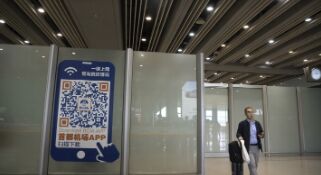China Reopens Borders: No More COVID Tests for Travelers, Ending Years of Isolation
China announces the end of the negative test requirement for incoming travelers, marking a milestone in reopening its borders and easing COVID-19 restrictions after years of isolation.
In a significant move towards reopening its borders and ending COVID-19 restrictions, China has announced that it will no longer require a negative test result for incoming travelers starting Wednesday. This marks a major milestone for the country, which had been isolated from the rest of the world for the past three years. The announcement was made by Foreign Ministry spokesperson Wang Wenbin during a briefing in Beijing on Monday. China had already lifted quarantine requirements for its own citizens returning from abroad in January, and in recent months, it has been gradually expanding the list of countries that Chinese people can travel to and increasing the number of international flights.
The decision to ease travel restrictions comes after China ended its tough domestic "zero COVID" policy in December. This policy, which had been in place for years, involved strict measures such as full-city lockdowns and lengthy quarantines for infected individuals. These restrictions had a significant impact on the country's economy, leading to rising unemployment and sporadic instances of unrest. During the height of the pandemic, incoming travelers to China were required to isolate for weeks at government-designated hotels. In some cases, residents were forcibly locked into their homes to prevent the virus from spreading. These measures resulted in protests in major cities like Beijing, Shanghai, Guangzhou, and Nanjing in November, posing a direct challenge to the Communist Party's rule.
In early December, authorities abruptly abandoned most COVID controls, which led to concerns about potential consequences. A study funded by the US government found that the rapid dismantling of the "zero COVID" policy may have caused nearly 2 million excess deaths in the two months that followed, far surpassing official estimates of 60,000 deaths within a month of lifting the curbs. During the height of the pandemic, local authorities in China occasionally imposed sudden lockdowns to isolate infections, leaving people trapped inside offices and apartment buildings. Shanghai, one of the largest cities in China, imposed a mass lockdown on its 25 million residents from April to June last year.
During this period, residents had limited access to PCR tests and had to rely on government food supplies that were often described as insufficient. Throughout the pandemic, Beijing touted its "zero COVID" policy and the relatively low number of infections as evidence of the superiority of China's political system compared to Western democracies. However, the lifting of restrictions has presented its own challenges, with the government now struggling with a sluggish economic recovery.
Additionally, diplomatic tensions with the United States and other Western countries have led some foreign companies to reduce their investments in China. China's latest decision to eliminate the requirement for a negative test result from incoming travelers represents a step forward in its efforts to restore normalcy. It signals a gradual shift away from the strict measures that had been in place for years, paving the way for increased travel and economic activity.




